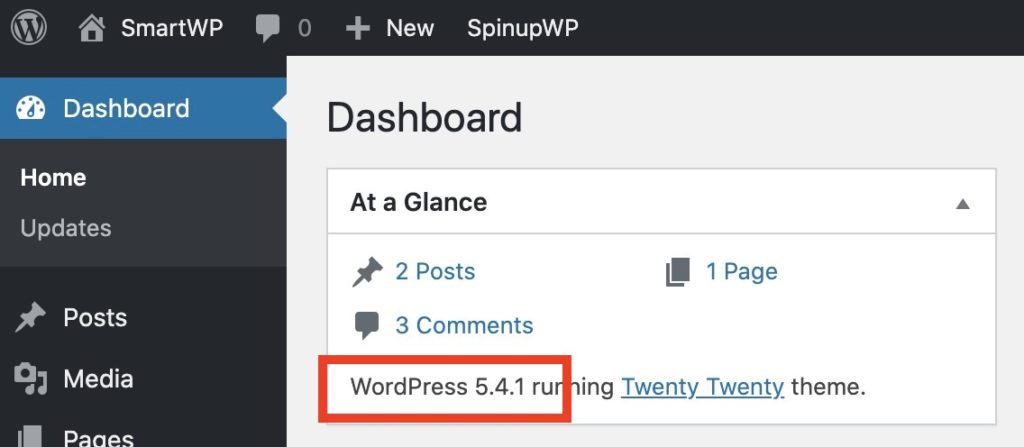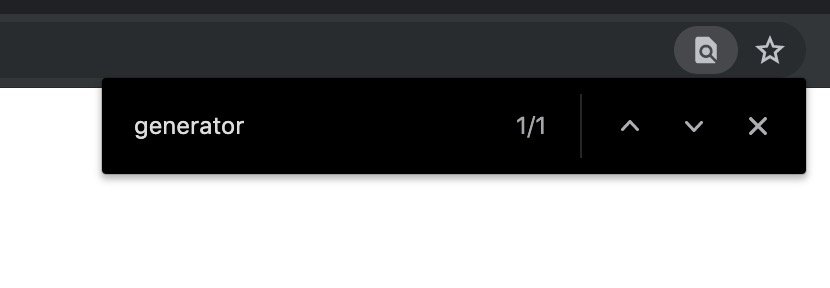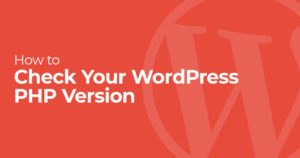It’s important to stay up to date with the latest version of WordPress. In this guide we’ll be showing you how to check WordPress version using a few different methods. Whether you can log into your admin or not these methods will cover a couple of ways to see what version of WordPress a site is using.
Key Takeaways
- The fastest way to check your WordPress version is from the admin dashboard under “At a Glance.”
- If you do not have admin access, you can view the site’s source code or RSS feed to try to find the version.
- Security plugins may hide the WordPress version from public view.
- Running the latest WordPress version helps keep your site secure and compatible with plugins.
- The latest WordPress version is 6.9.1, available on WordPress.org.
You can always see the latest version of WordPress on WordPress.org. It’s important to run the latest version of WordPress for security and bug fixes.
Latest WordPress Version: 6.9.1
You can download the latest version of WordPress on wordpress.org
Here are 5 simple ways to check WordPress version of your website:
1. Checking Your WordPress Version in the Dashboard
By far the easiest and fastest way to find the WordPress version of your site is to log into your WordPress dashboard. After logging in you’ll instantly be able to see your current WordPress version.

You current WordPress site version will be under the “At a Glance” section on the main admin dashboard page.
2. See WordPress Version by Viewing Page Source Code
You can view the WordPress version used for any site simply by viewing the source code of any page on their site. This method is ideal if you want to determine WordPress version without logging into a site.
Simply just right click in your browser and click “view source”. This will allow you to see the source code of the page (in this example we are using Google Chrome).

Once you are viewing the source code hit Control+F on the page and search for the word “Generator”. There should only be one result and you will be able to see the WordPress version of the site with it.

Note that this won’t work on every WordPress blog since many security plugins will hide this from the front end. But if the site has it you’ll see the active version of WordPress a site is using.

3. View the Site’s RSS Feed
You can find the RSS feed of most WordPress sites by accessing yourwebsite.com/feed/. This will bring up the WordPress site’s RSS feed.
Once you’re viewing the RSS feed you can search for the word “generator” which will indicate what version of WordPress is used.

This can be an easy way to see the version of a site you don’t have admin access to.
4. Get WordPress Version (PHP Snippet)
The following PHP snippet will output the version of WordPress your site is currently using. This is useful for plugins and theme development if you want functions to require a specific version of WordPress.
| <?php | |
| //Display the WordPress version number | |
| echo get_bloginfo( 'version' ); |
Why Check the Version of WordPress You’re Using?
There are a few reasons why the version of WordPress you’re using matters but it can be boiled down into 3 reasons: security & stability, compatibility and features.
- Security & Stability: Arguably the most important reason for knowing your WordPress version is to be aware of any security holes. If your WordPress version is outdated you could run into stability issues as well and more bugs over time.
- Compatibility: When upgrading and uploading plugins many list what version of WordPress they are compatible with. So nothing which version your site is running can lead to fewer conflicts when making changes to plugins or themes.
- Features: Each major version of WordPress typically includes new features, for example WordPress 5.5 added functionality for XML sitemaps making one less plugin required.
Frequently Asked Questions
Why can’t I see my WordPress version in the source code or RSS feed?
Security plugins often hide the version to prevent attacks. In these cases, check the version from the admin dashboard instead.
How do I update WordPress to the latest version?
Go to your admin dashboard. Click Updates, then click “Update Now.” Always back up your site before updating.
Is it safe to display my WordPress version publicly?
It is safer to hide your version. Hackers target known vulnerabilities in older versions.
What is the latest WordPress version?
As of now, the latest version is 6.9.1. Get it from WordPress.org.
Can I check the WordPress version without logging in?
Yes, by viewing the site’s source code or RSS feed. However, these may be hidden by security measures.
Conclusion
With all of these ways to check your WordPress version, you’re sure to know what version a site is using (or one of your own sites). Many security plugins will block ways for front end users to see a site’s version so if you were unable to use these methods on a site that is most likely why.



12 Responses
Thank you, the feed version worked nicely for the site I was checking. Cheers!
The feed trick worked for me, too.
Thank you very much for providing textual information, in addition to the video. Learning with videos is increasing amazingly, but reading text, at our own pace, is still better to really master and memorize contents.
I’m a former web designer, trying to help an organization I’m involved with. I did not use WP when I was a web designer (Dreamweaver) but I’ve made a few WP and Joomla sites and am very familiar with the dashboard, I can still FTP to web hosts, etc. However, the site I’m trying to help with was set up by someone 8 years ago and they set it up at wordpress.com, not at a web hosting service, I suppose because it’s free hosting.
So there is no Dashboard, I don’t know how to FTP to wordpress.com to try the php idea, the version is not in the generator tag, they don’t use RSS. I’ve looked all over the settings and other menu items.
All I want to do is get rid of whatever is auto-generating .webp images!! I can’t find a plugin that’s doing this, and can’t find anywhere to turn it off. In the WP documentation, I see that this was somebody’s great idea to have WP automatically generate webp images!!! So I thought maybe it’s a super old version and if I got the latest update I’d have an option to turn this stupid thing off. But now I think it’s a NEW (bad) idea.
I did not mean there is NO dashboard, but there is no version number anywhere and the dashboard is a little different from what I’m used to seeing.
Never mind! I uploaded images and they did not automatically get converted to webp. I was able to save and convert to jpg the only image I needed using Paint.
Glad you figured it out Barb! The open source version of WordPress does not converts to webp by default. It looks like you’re using WordPress.com, likely it’s an option in WordPress.com (you can email their support) I would highly recommend leaving it enabled though since it’ll make all aspects of your site faster.
> When WordPress is installed it included a readme.html file. This file will reveal the WordPress version and is often front end accessible.
This is wrong.
Great catch, they must have removed it which is a good move! I’ll modify the article
Andy, WordPress still includes readme.html as part of any core files update. Some websites, through security plugins, rename that file to readme-severalrandomnumbers.html. Some hosting providers force a 403 error on readme.html (and license.txt) for the same reasons (security). WordPress will not NOT ship with readme.html, though.
Correcting the last line (apologies for the incorrect initial wording).
WordPress will not NOT ship without readme.html, though.
Hey Doug, the issue is actually that the version number has been removed from the readme.html file.